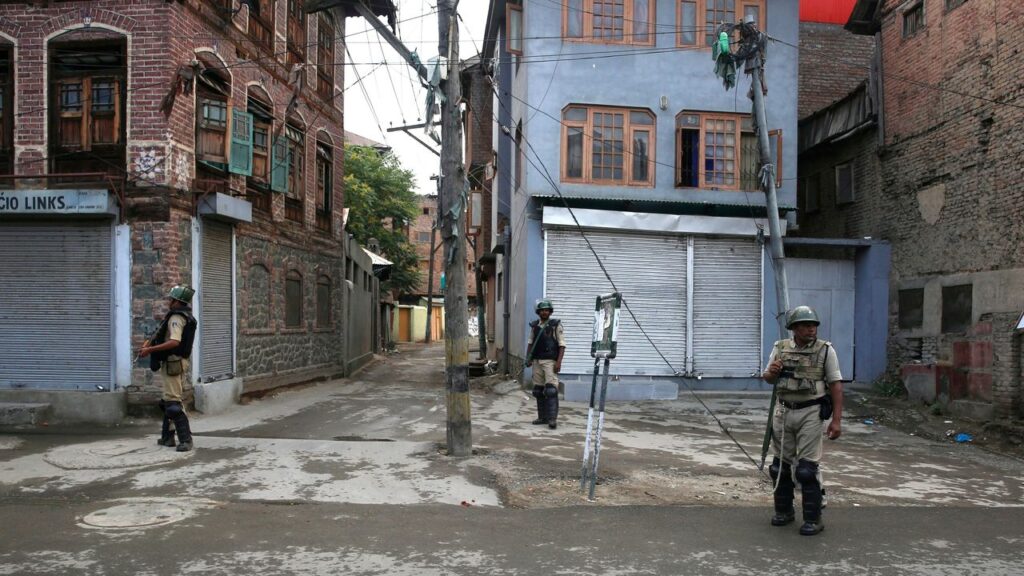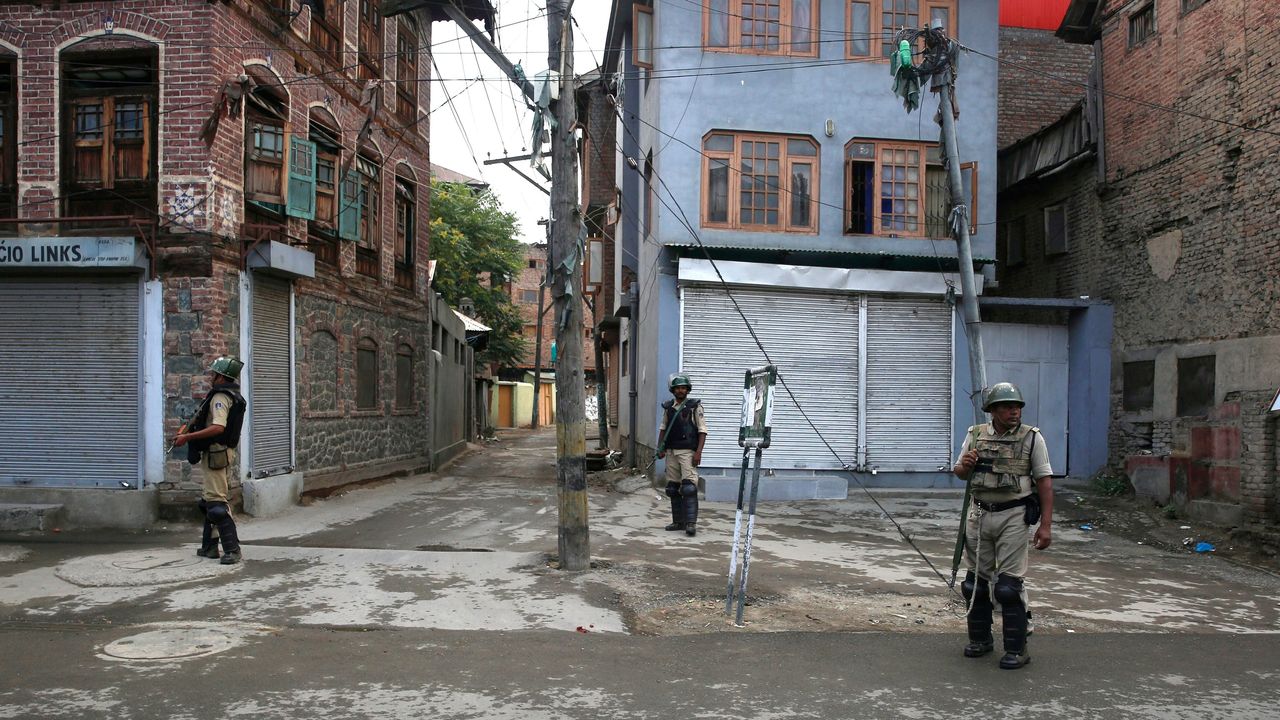
A separatist movement has gripped the region of Jammu and Kashmir since Independence. This movement intensified in 1989 when militants infiltrated the area and became the main opposing force to the Indian administration in the region. Militancy brought with itself a lot of strain in Kashmir’s otherwise neutral Hindu-Muslim relations, eventually leading to the exodus of Kashmir’s Hindu Pandit population in 1990. Around 1,70,000 Kashmiri Hindus were displaced—many moved to Jammu—an inherently Hindu-majority region, while some fled the state itself. Those who remain face dire situations.
As the militant separatist movement gained political capital, its targets seem to have changed—all political presence from the Indian mainstream is now under siege. These attacks transcend religious divides; it is no longer just about the Pandit community. The maxim of the militancy now seems to be to challenge every remnant of Indian polity in the Valley.
Ajay Pandita
They shot my father at the back. They are cowards. They knew nothing would happen to Ajay Bharti (Pandita), so they had to attack from the back.
“They shot my father at the back. They are cowards. They knew nothing would happen to Ajay Bharti (Pandita), so they had to attack from the back (sic)”, said a distraught Niyanta Pandita, daughter of late Ajay Pandita. Pandita was a Kashmiri Pandit, member of the Congress Party, and sarpanch of Larkipora in the Anantnag district of Jammu and Kashmir.
It was the evening of June 8th, 2020. Ajay Pandita was at his orchard when unidentified militants shot him. Although police and ambulances rushed Pandita to the hospital, he succumbed to his injuries on the way to the hospital.
Pandita, along with his family, was forced to migrate to Jammu at the time of the Kashmiri Pandit exodus in 1990. However, he moved back to Kashmir in 1996—one of the few who did so. After that, he worked towards cementing his reputation as a leader in Khanabal, Anantnag. His father, Dwarikanath Pandita, spoke of his son’s missions—to put a stop to the rancorous disputes between the Pandits and Muslims, bring back to life Kashmiriyat and Sufism in the Valley. He was a fierce leader who gained popularity even among the Muslims of his community, which led him to be unanimously made sarpanch in 2018.
Union minister Jitendra Singh claimed Pandita’s murder an attempt by anti-national entities to thwart the efforts of establishing democracy in Jammu and Kashmir.
Ghulam Ahmad Mir, the president of the Congress party in Jammu and Kashmir, admitted that the sarpanch was not provided with any security cover. This lead to a judicial inquiry into this dire happening. Dwarikanath Pandita admitted that his was the only Pandit family of the locality. Despite this, the family never felt unsafe, and Ajay’s killing has caught the community off guard.
“Pandita was a basic member of Congress, and this is the second killing of a Congress sarpanch in this area in the recent past which needs to be looked into. We want Lieutenant Governor GC Murmu to order a judicial probe into the killing to unveil the conspiracy and the negligence in protecting the precious lives,” said Ghulam Ahmad Mir, President, Jammu and Kashmir Congress committee.
A brave man who served his country ferociously, the attack on the grassroots political worker has left the community and his family in fear of their safety. Pandita’s remains were carried in the Tricolour. People of the region and members of the Congress Party bellowed their condemnation for Pakistan and the terror group, The Resistance Front (TRF)—an offshoot of the Lashkar-e-Taiba (LET). However, no terror outfit has taken open responsibility for the incident.
The incident has triggered a mass emigration of Pandits from the Valley to Jammu. It was only as early as February that representatives from the Kashmiri Pandits’ community met Union Home Minister Amit Shah at the capital city. They voiced the rehabilitation of the community from the Valley to be a matter of utmost urgency. The Home Minister had acknowledged their concerns while confirming the situation to be a priority under the Modi government.
On the flip side of the coin, Pandita’s death marks the first slaughter of a Kashmiri Pandit in the Valley in years. It occurs at a time when the Pandits of the Valley looked at a hopeful future—one wherein they were homeward bound.
Wasim Bari
On the 8th of July 2020, nearly a month after Ajay Pandita’s death, 3 Bharatiya Janata Party (BJP) leaders were slain.
It was 9 PM when Wasim Bari, former BJP president of the Bandipora district, Northern Kashmir was shot dead by a bike-borne assailant. His brother, Umar Sultan, and father Bashir—both members of the BJP—were also shot. Although the three were promptly taken to the hospital, they soon passed away succumbing to head injuries.
With the family being assigned with as many as eight security personnel, the incident came as a shock. At the time of the attack, the security was stationed on the first floor of Bari’s house while the shooting took place outside the premises.
Shocked and saddened by d killing of young BJP leader Wasim Bari and his brother by terrorists in Bandipora. Bari’s father who is also a senior leader was injured. This despite 8 security commandos. Condolences to d family. pic.twitter.com/hAKnOudaxj
— Ram Madhav (@rammadhavbjp) July 8, 2020
“Shocked and saddened by d killing of young BJP leader Wasim Bari and his brother by terrorists in Bandipora. Bari’s father who is also a senior leader was injured. This despite 8 security commandos. Condolences to d family (sic)”, tweeted BJP’s General Secretary Ram Madhav while stating that the laxity of the security forces will be dealt with strictly. The guards were taken into police custody post the incident, and an investigation was launched into this matter.
“In a cowardice act, terrorists from Pakistan took advantage of the dark of the night to attack Bari, his brother, and father. He was a patriot, a true nationalist (sic),” said Ravinder Raina, state BJP president.
No terror group has openly claimed responsibility for the attack. The Inspector-General of Police in Kashmir, Vijay Kumar, claims that two terrorists from Pakistani based terror group, Lashkar-e-Taiba (LeT), were behind the attack.
Arif Ahmad & Sajjad Ahmed Khanday
It was the 4th of August, 2020. Article 370 of the Indian Constitution—granting special privileges to Jammu and Kashmir had been abrogated in Parliament one year ago. The newly-bifurcated states were on alert—Police and the Central Reserve Police Force were spread across the Valley. Unfortunately, a BJP sarpanch in the Kulgam district was shot by militants that day.
The incident took place in Arkhan, situated in the Kulgam district where Arif Ahmad was open fired at by militants at close range in his own home.
Ahmad has been shifted to the emergency wing of an Anantnag hospital having sustained a bullet shot in the chest (and neck, although this is unconfirmed). His condition has been reported as critical.
Further details of Ahmad’s state are yet to be awaited.
BJP spokesperson Altaf Thakur confirmed Ahmad’s ties to the party while condemning the “barbaric attack”.
In less than 48 hours of the offence on Arif Ahmad, Sajad Ahmad Khanday, another BJP leader and sarpanch was shot by militants who appeared to have studied the domain of attack carefully. The assault took place outside Khanday’s residence also located in the Kulgam district.
He was taken to the same hospital as Arif Ahmad. However, being in a critical condition, he succumbed and was stated to be brought dead.
Outgoing lieutenant governor GC Murmu confirmed that the situation was being assessed. “We have seen that some soft targets are there. A lot of terrorists have been neutralization recently, so there are some desperate actions. Wherever it is required, we are providing security. It is a continuous process to assess the threat(sic),” he said.
Given all these incidents, it is explanatory that Panchayat leaders belonging to minority communities are panic-stricken.
Panchayat members vociferously made known their demands—they will not be returning to the Valley until promised adequate security.
Abdul Hamid Najar
Abdul Hamid Najar, a BJP leader from Kashmir’s Budgam district, was taking a walk in the morning of August 9th when terrorists shot him. He was provided with a security detail, but set out for a walk that fateful morning unbeknownst to this detail. This is the fourth terrorist attack on a BJP leader in the last two months. He succumbed to his injuries the next day. Abdul was Budgam district BJP’s Other Backward Classes (OBC) morcha president.
The similar modus operandi adopted by these militants in these killings indicate a worrying precedent—that of assassinations. Kashmir is in turmoil—a protracted lockdown has plunged the state into a strange fusion of police rule and lawlessness. The plight of the displaced Kashmiri Pandit community further exacerbates this problem.
Written by Lekhya Reddy and Avaneesh Jai Damaraju for MTTN
Featured Image courtesy: Wall Street Journal

Leave a Reply
You must be logged in to post a comment.